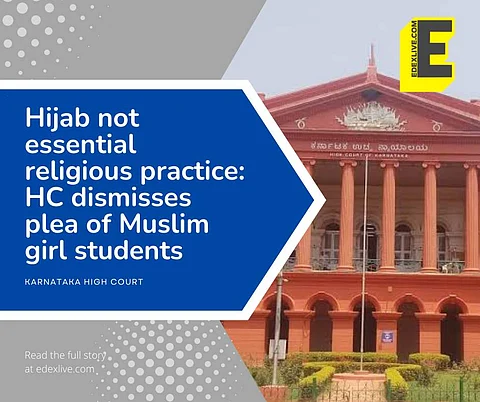

The Karnataka High Court has concluded that the hijab is not an essential religious practice under Islam and, therefore, doesn't qualify for protection under Article 25 of the Constitution. In its judgment in the petitions filed by Muslim students from Udupi, who were allegedly stopped from wearing their hijab to the Government Pre University College, the High Court decided that the pleas were not maintainable and, therefore, would invite no disciplinary action against the college authorities and the College Development Committee (CDC).
The full-judge Bench, led by Chief Justice Ritu Raj Awasthi, pronounced its verdict after 11 days of hearing the matter. It also concluded that the Government Order of February 5 did not violate any rights of the petitioners and was well within its bounds to say that students must wear the prescribed uniform. The order also said that a prescribed uniform does not infringe upon any rights and comes well within the clause of reasonable restrictions added to Article 14 of the Constitution.
The nature of India's secularism
The full Bench of the High Court, in its judgment, observed that India practises "posititve secularism" and added, "It is pertinent to mention here that Article 51A(e) of our Constitution imposes a Fundamental Duty on every citizen "to promote harmony and the spirit of common brotherhood amongst all the people of India transcending religious, linguistic and regional or sectional diversities; to renounce practices derogatory to the dignity of women". It referred to this particular mention in the Constitution to validate the Karnataka State Government's reference to the Karnataka Education Act of 1983, which, in Section 7(2)(v) & (vi), reiterates the "constitutional duty to transcend the sectional diversities of religion". On this basis, the Court said that the state is well within its rights to prescribe and uphold suitable curricula for educational institutions.
Interpretation of Article 25
The court also noted that prescribing a uniform was a reasonable restriction under the right to freedom of conscience that is protected under Article 25 of the Constitution. "Limitations imposed on religious practices on the ground of public order, morality and health having already been saved by the opening words of Article 25(1), the saving would cover beliefs and practices even though considered essential or vital by those professing the religion," said the judgment. The Bench concluded that this gives the State the power to regulate or restrict freedoms under Article 25.
The test of Essential Religious Practice
The court turned to the judgment in the case of Acharya Jagdishwaranand Avadhuta and Ors v. Commissioner of Police, Calcutta, 1984, which said, "Essential practice means those practices that are fundamental to follow a religious belief. It is upon the cornerstone of essential parts or practices that the superstructure of a religion is built, without which a religion will be no religion. Test to determine whether a part or practice is essential to a religion is to find out whether the nature of the religion will be changed without that part or practice." The court noted that the foundation of the religious practice pre-dating the foundation of the religion is an essential marker in the test of ERP and a practice being merely followed since time immemorial does not stand up to this requirement.
Does the hijab violate constitutional values?
Referring to the Shayara Bano case, colloquially known as the Triple Talaq case, the Bench said that protection under Article 25 can be granted only if the practice doesn't oppose "constitutional values" that guarantee dignity and equality to individuals. However, the qualification of the practice under ERP is the threshold requirement and when that fails, the matter doesn't reach the question of constitutional values, concluded the court.
Does the Quran make the hijab mandatory?
Amidst the many translations and interpretations of the Quran, the court decided to rely upon ‘The Holy Quran: Text, Translation and Commentary’ by Abdullah Yusuf Ali, adding that there was a consensus at the Bar about its "authenticity and reliability" and that they found it "immensely appealing to reason and justice".
The court concluded that the hijab was not mandated by the Quran and is only a directory. This conclusion was drawn from the fact that there was no prescription of penalty or penance for not wearing the hijab. The court also cited Abdullah Yusuf Ali's interpretation of the Sura (xxxiii) verse 59, which was cited by the petitioners. In the footnote, Ali says, “The object was not to restrict the liberty of women, but to protect them from harm and molestation under the conditions then existing in Medina."
The judgment read, "At the most, the practice of wearing this apparel may have something to do with culture but certainly not with religion. Thus, it can be reasonably assumed that the practice of wearing hijab had a thick nexus to the socio-cultural conditions then prevalent in the region. What is not religiously made obligatory therefore cannot be made a quintessential aspect of the religion through public agitations or by the passionate arguments in courts."
Can the hijab be protected under Freedom of Conscience (Article 25)?
The court said that there was a distinction between Freedom of Religion and Freedom of Conscience, and the petitioners had not established that wearing the hijab was associated with their conscience. "There is no evidence that the petitioners chose to wear their headscarf as a means of conveying any thought or belief on their part or as a means of symbolic expression. Pleadings at least for urging the ground of conscience are perfunctory, to say the least," said the Bench.
